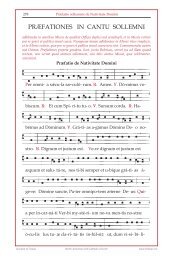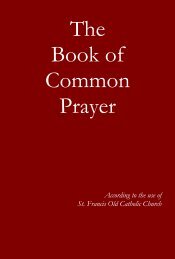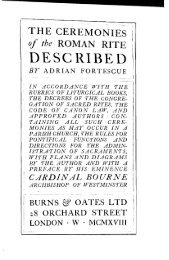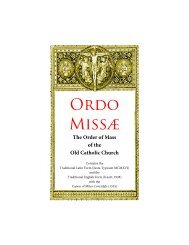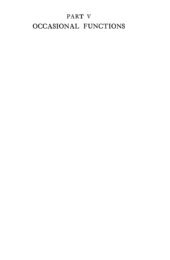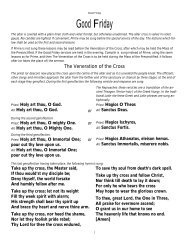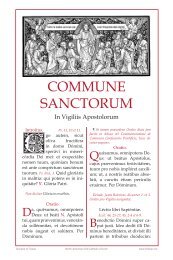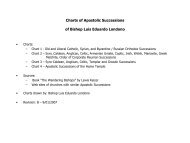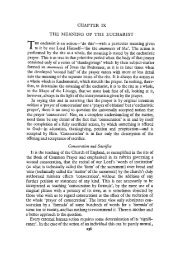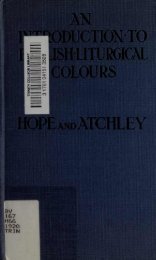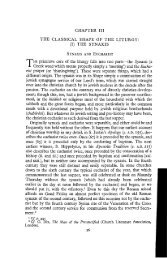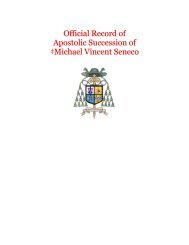Eucharist and Lord's Supper
Eucharist and Lord's Supper
Eucharist and Lord's Supper
Create successful ePaper yourself
Turn your PDF publications into a flip-book with our unique Google optimized e-Paper software.
THE SHAPE OF THE LITURGY<br />
If the comm<strong>and</strong> 'Do this' does not mean that our Lord supposed He<br />
was instituting a new rite, what does it mean? The emphasis must be on<br />
the other half of the sentence-'for the re-calling of Me.' He is not instituting<br />
a new custom, but investing a universal jewish custom with a new <strong>and</strong><br />
peculiar meaning for His own chabUrah. When they 'do this'-as they will<br />
assuredly do in any case-it is to have for them this new significance. He<br />
will no longer be with them at their future meetings. He is going to His<br />
death before to-morrow night, <strong>and</strong> He knows it now, though He had so<br />
longed to keep this Passover with them.! But that does not mean that the<br />
chabUrah will never meet again. On the contrary, the impression of all<br />
those months <strong>and</strong> years with Him will not simply be effacedas though they<br />
had never been by to-morrow night. The chabUrah will meet again, somewhere,<br />
some time. And whenever it does meet, it will inevitably begin its<br />
supper by 'breaking bread', as all chabUr8th do. But when that particular<br />
chabUrah 'does this'-after to-morrow-they will not forget His words on<br />
this occasion!<br />
Something like that His words must have conveyed to the apostles when<br />
they heard them for the first time, <strong>and</strong> very puzzled they must have been.<br />
There was not very much in the words 'This is My Body which is for<br />
you', spoken without comment <strong>and</strong> heard without knowledge of the words<br />
He wasgoing to say as He h<strong>and</strong>edthem the cupafter supper, to give them any<br />
particular clue as to what the new meaning for them ofthis ordinary action<br />
was to be.<br />
After this enigmatic remark supper proceeds as usual, though with a<br />
quite unusual sadness, <strong>and</strong> after a while with a growing <strong>and</strong> terrible feeling<br />
of tension. There were the incidents of Judas' sudden departure <strong>and</strong> the<br />
sorrowful prophecies of betrayal <strong>and</strong> denial <strong>and</strong> desertion, <strong>and</strong> all the rest<br />
of the story that we know so well. At last the meal is over, <strong>and</strong> the time for<br />
the final rinsing of h<strong>and</strong>s has come. It is probably at this point, rather than<br />
at the rinsing before the meal, that Jesus makes His only change in the<br />
absolutely normal procedure of any chaburah supper-one that He Himself<br />
calls an 'example' which they should in future imitate. 2 Instead of<br />
leaving this menial officeto the youngest or 'the attendant' whose duty it<br />
was,3 He Himself, their 'Master <strong>and</strong> Lord' (Rabban <strong>and</strong> Maran, the<br />
loftiest rabbinic titles of reverence) takes the customary towel <strong>and</strong> basin,<br />
<strong>and</strong> with heartbreaking humility washes not their h<strong>and</strong>s but their feet. He<br />
comes, apparently, to Peter last of all, probably because Peter was the<br />
eldest of them all, <strong>and</strong> 'when there are more than five persons present'<br />
it is good manners to begin this rinsing of the h<strong>and</strong>s with the youngest<br />
<strong>and</strong> end with the eldest. 4 Then He reclines once more upon the 'first<br />
1 Luke xxii. 15. • John xiii. IS.<br />
3 Berakoth, Tos., vi. 5 (p. 68). The 'attendant' might be a member of the chabUrah,<br />
even a rabbinical student.<br />
• Ibid. v. 6,p. 50.



